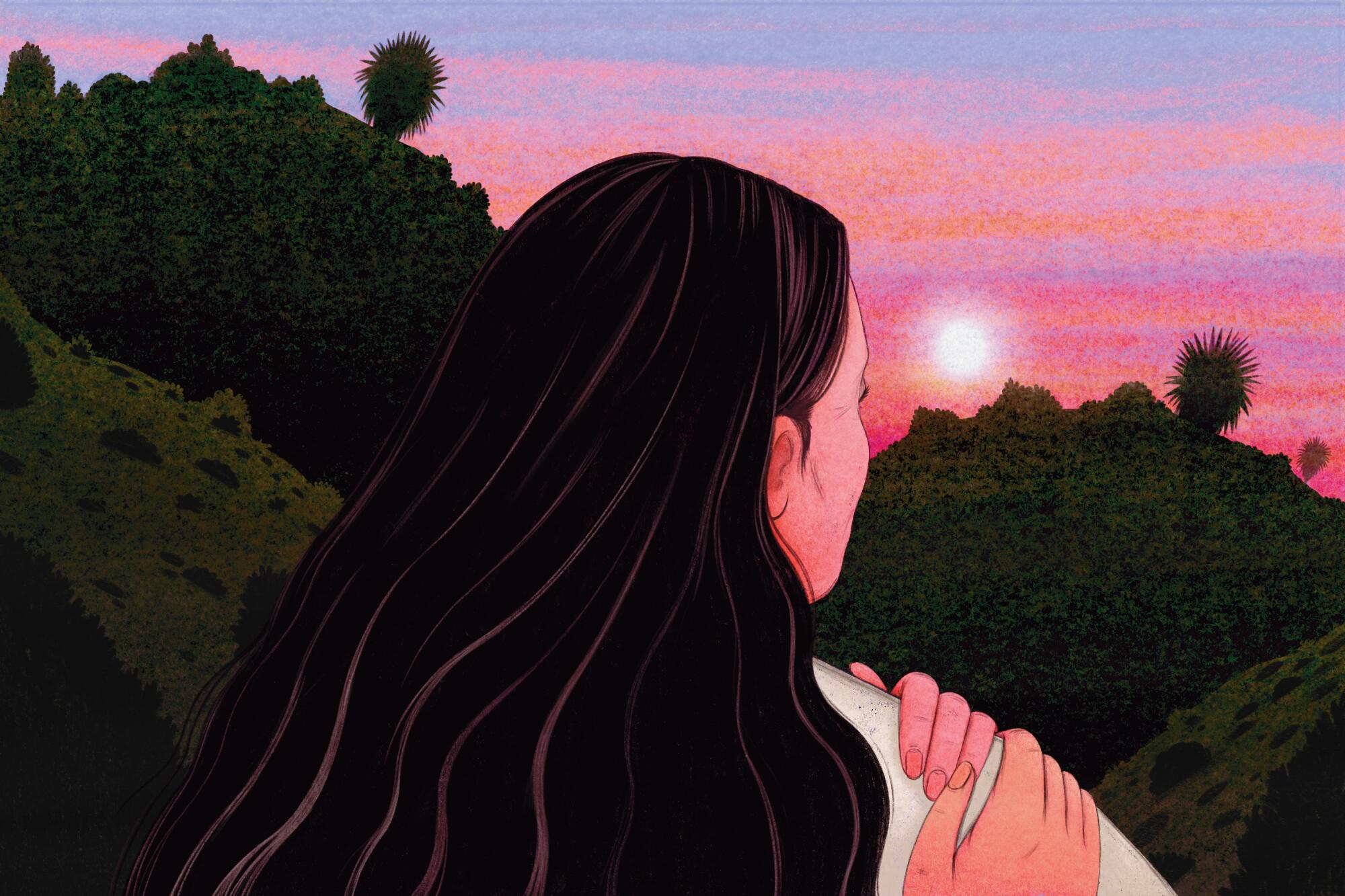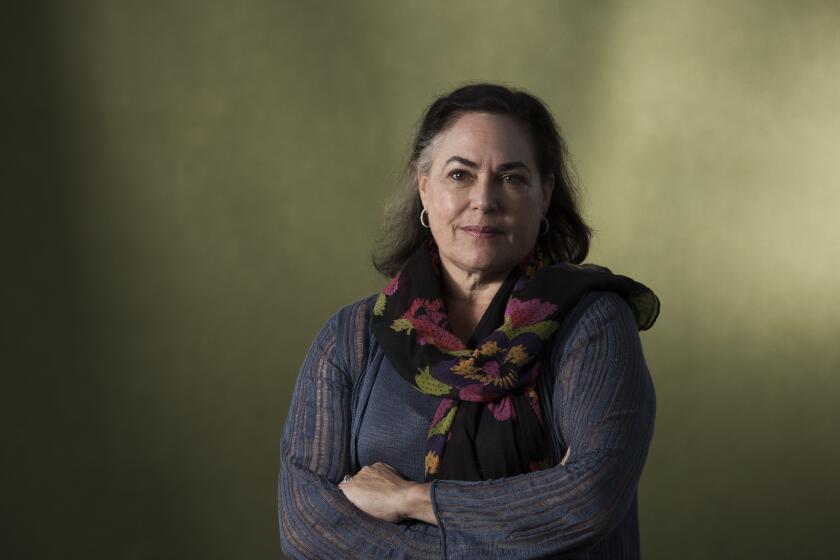
- Share via
A man from the home care agency calls on a Monday morning. “The caregivers are complaining. It’s too hard to transport Sara, to move her from the bed to the wheelchair and onto the stairlift. You need a lift or some other assistive device.”
A rush of sadness settles into my body. The end has arrived. “Sara is leaving on Friday,” I say, “Can we hold out till then?”
“Oh,” he says, and pauses, “I’m so sorry to hear this.”
My partner, Sara Flint Greenberg, was nearing the end of her nine-month journey through amyotrophic lateral sclerosis, more commonly known as ALS or Lou Gehrig’s disease, and she would take her life on Friday.
There is nothing more we could do. Her body has been ravaged by this devastating disease and she has been crystal clear, from the beginning, that she would leave when she can no longer take care of herself.
There are steps to the end of this journey.
‘Death with dignity’ laws make assisted suicide possible in the U.S., but those laws don’t apply if you’re suffering from Alzheimer’s.
Later that Monday morning, Sara speaks with a doctor, answering some required questions. Does she have less than six months to live? Is she mentally capable of making the decision to end her life? Can she self-administer the medication? Luckily, the session is short. Sara spends much of her day on a machine which helps her to breathe. Too much talking leaves her gasping.
On Wednesday morning Sara speaks with a second doctor who agrees that she qualifies to receive medications that assist in dying under the requirements of the California End of Life Option Act. The medication that will allow Sara to leave will be ready on Friday.
On Wednesday afternoon we celebrate our wedding. Sara and I marry in the late November light of our living room. I am not strongly attached to marriage, but as the day of Sara’s passing drew closer, I felt an overwhelming need to express the beauty of our love in ceremony.
The temporary chuppah is held over our heads by Sara’s sons Aaron and Jacob, our friend Audrey and a caregiver. We have found an independent rabbi to marry us because I am not Jewish. The rabbi is adorable in her Converse sneakers, covered with stars, as she takes us through this bittersweet ceremony. The ceremony is short because Sara is exhausted. It is her last gift to us, her family.
On Friday morning, our friend Margaret arrives from New York, kisses Sara on the cheek and tells her she loves her. It is all anyone can do. Audrey is in the kitchen. She has been with us for days, helping us through.
Later in the morning, a rabbi from our synagogue arrives to help us say goodbye to Sara. Margaret and Audrey go downstairs to wait. They sit, mostly silent and sometimes hold hands. The room feels heavy. They can hear Sara breathing above them, but they know she will not be there for long. It is one of the most reverent acts of love: to witness in silence the death of another.
At noon, Sara takes a pill to prevent nausea and vomiting when she takes the medication that will end her life. I sit beside her on the couch, Aaron is at her feet and Jacob is across from her. The rabbi is just beyond our circle as he begins to guide us through our final words. Everything is said on the edge of tears. We listen closely to hear our soft voices.
Sara regrets, deeply, that she will never see her grandchildren. She will not see her sons grow further into their lives or settle down with partners and start families. She gathers her breath and questions them closely because this is her last chance. She wants to know what their futures looks like because she will not be there.
There are apologies because anything left to be said has to be said. Death demands it. We make promises because who would say no? Sara would do anything for her sons and I promise to do the same. We celebrate Sara’s bravery. She left a longtime marriage, late in life, and jumped into love with me. And the bravery she shows today in making this choice.
The rabbi asks Sara where we can find her after she’s gone. “Walking in these hills,” she says, of the land surrounding our home where she once walked every day. She is now struggling to breathe and is silent. We are left with silence and the presence of love. We will carry this love everywhere we go.
Nicholas Goldberg: Should our aid-in-dying laws be expanded, or are we moving too far too fast?
Even as attitudes toward assisted suicide and euthanasia seem to be loosening, Canada’s liberal laws are causing bioethicists concern.
It is almost an hour after Sara took the anti-nausea pill. She must take the medication now or wait for another day. The hospice nurse has not yet arrived. We call our hospice provider. They tell us to mix the medication with apple juice and give Sara sorbet because the taste can burn her throat. Sara reaches for the medication with both hands. She is ready to leave.
As the medication moves through her body, she prays in Hebrew: “HaShem Sheli, HaShem Sheli, ya’azor li” (“My God, my God, help me”). She recites the Shema, a centerpiece of prayer services in Judaism. As she draws closer to leaving, her last words are “Thank you, thank you,” a beautiful sentiment and a sign, I hope, that she is at peace.
Sara slides slowly down the couch, her cheek resting against the back of my hand. I feel life in her body, but after half an hour I am not sure. The hospice nurse has arrived. I ask him if she has passed. No, she is still here. Another half hour and I ask again. He checks her pulse. She has left.
My beautiful Sara is gone.
Nina Rota is a writer in Hollywood. She is currently working on a memoir, “Walls Crumble Before Me.” Her wife, Sara, died in 2022.
More to Read
A cure for the common opinion
Get thought-provoking perspectives with our weekly newsletter.
You may occasionally receive promotional content from the Los Angeles Times.











